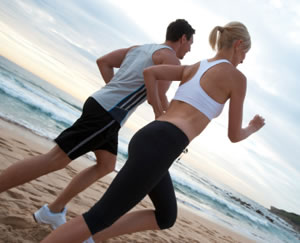Search Healthnotes
- By Maureen Williams, ND
Probiotics Keep Athletes Healthy
A healthy dose of “good” gut bacteria may do more than keep digestive ailments at bay. A study published in the International Journal of Sport Nutrition and Exercise Metabolism found that athletes who took a probiotic supplement during the winter had fewer colds and other upper respiratory tract infections.
The study included 84 people who were training an average of ten hours per week in endurance sports such as cycling, running, swimming, triathlon, team games, and racquet sports. They were divided into two groups: a probiotic group and a placebo group.
The probiotic group received 65 ml (about 2 ounces) of a dairy-based probiotic supplement containing at least 6.5 billion cells of a strain of lactic acid bacteria known as Shirota. The placebo group received a dairy-based drink with no probiotic, twice daily for 16 weeks (mostly in the winter). The athletes kept track of any upper respiratory symptoms throughout the study, and markers of immune function were measured in saliva and blood samples taken at the beginning, middle, and end of the study.
The placebo group received a dairy-based drink with no probiotic, twice daily for 16 weeks (mostly in the winter). The athletes kept track of any upper respiratory symptoms throughout the study, and markers of immune function were measured in saliva and blood samples taken at the beginning, middle, and end of the study.
Athletes who took a probiotic supplement had fewer colds and other upper respiratory tract infections
Fewer infections in probiotic users
At the end of the study:
- Fewer people in the probiotic group (66%) had a upper-respiratory tract infection during the trial compared to the placebo group (90%).
- People in the probiotic group reported fewer days with upper-respiratory symptoms, and spent less time on medications for their symptoms.
- People taking the probiotic who got sick were less likely to have to interrupt their training schedules.
- The placebo group reported more days with gastrointestinal discomfort compared to the probiotic group.
- Levels of infection-fighting antibodies in the saliva were higher in the probiotic group.
“These positive clinical consequences provide evidence for the beneficial effects of daily Lactobacillus casei Shirota ingestion in…highly physically active people,” the study’s authors said. They further proposed that L. casei Shirota might prevent infections by strengthening the general immune response.
Happy lactobacilli = healthy you
Lactic acid bacteria, including Lactobacillus species, are a small but important part of the gut ecosystem. There are at least 125 known species of lactobacilli, and many of them have been studied for their positive effects on health. Here are some ways to support healthy Lactobacillus colonies in your gut:
- Eat foods that are cultured or fermented with lactobacilli. These include yogurt, beer, wine, cider, sourdough bread, and some sauerkraut, kimchi, and pickles. Remember that pickles that are prepared with vinegar do not have these beneficial bacteria. Pasteurized sauerkraut also has no living lactobacilli.
- Eat foods that lactobacilli like to eat. Lactobacilli thrive on fiber, especially the fibers found in fruits and vegetables like bananas, onions, garlic, and Jerusalem artichoke. Whole grains also provide some fibers that lactobacilli like. Refined foods do not feed health-promoting bacteria.
- Take antibiotics only when necessary. Lactobacilli are especially vulnerable to antibiotics. Remember that antibiotics don’t shorten the course of the common cold, since antibiotics do not kill viruses.
- When you need a supplement, look for quality. Some probiotic supplements have been found to be unreliable, mostly because keeping the bacteria alive requires special handling. Dairy-based supplements are generally a safe bet, but if you don’t tolerate dairy, look for a supplement that has been stored in the refrigerator and comes from a reputable company. Consult a natural health practitioner if you need help.
(Int J Sport Nutr Exerc Metab 2011;21:55–64)











